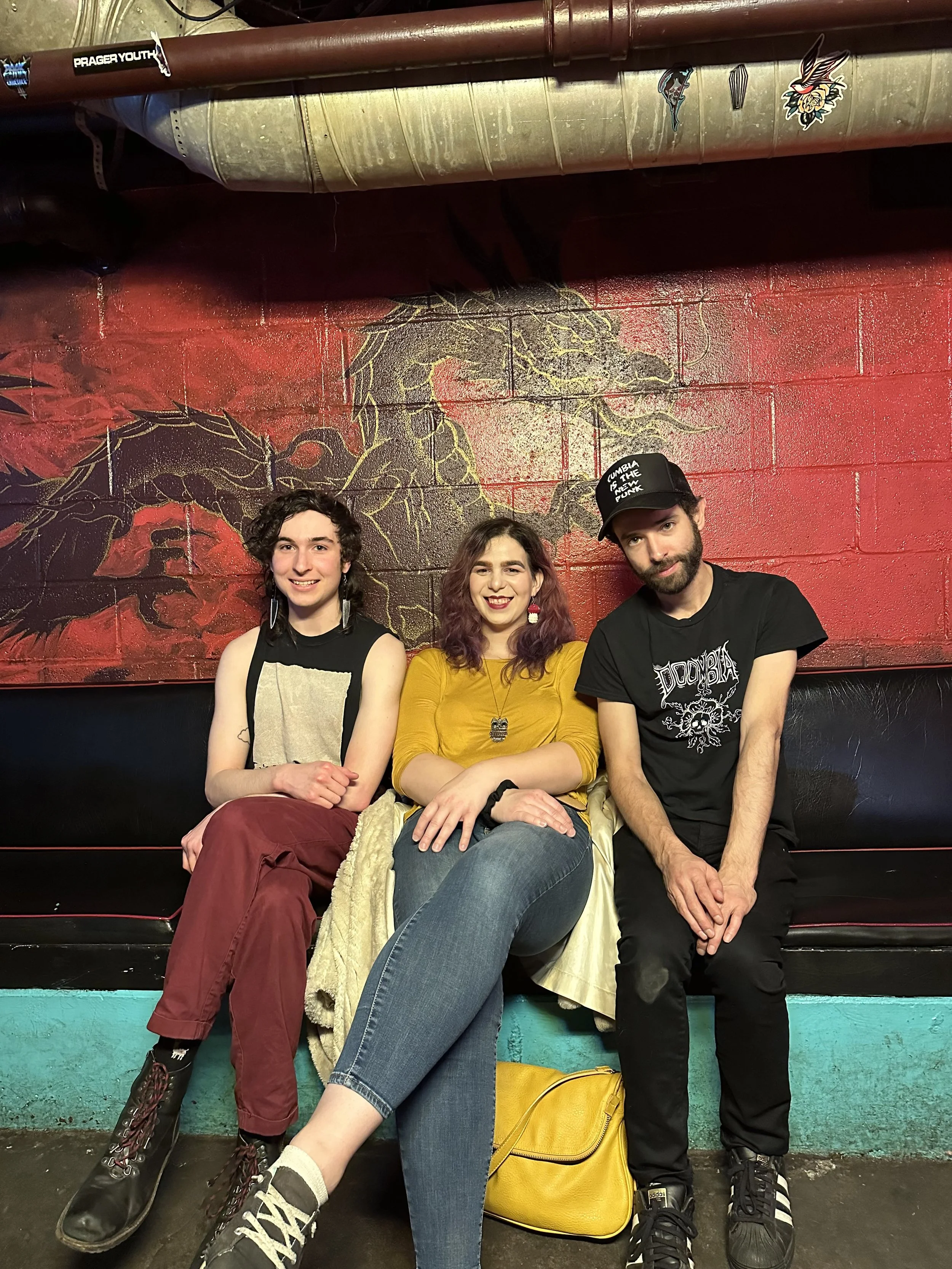The Blend is the Key: Doombia
Photo by Ashlee Turner
Josefina Del Norte Reports:
Beneath the thick, slow distortion of a melancholic guitar riff dances a rhythm uncharacteristic of the usual doom metal sound. Unexpectedly sewn into the dirge of crunching, tuned-down guitars is laced a meditative Latin beat, and a psychedelic flow typical of the Chicha stylings of Peru. The classic Cumbia step at times merges with a mangled guitar solo, or the verbed-out vocals of Brendan Deiz, in an atmospheric hybridization of two musical worlds; this is the danceable darkness of Doombia.
Brendan Deiz, the heart and creator of the band, was born in Portland as the cultural heir to a family tree that traces roots to his mother’s Irish/Scottish/British heritage, and the paternal lineage of his Afro-Caribbean ancestors from Cuba. His family’s roots go deep in Oregon, too. “My Cuban great-great-grandfather fell in love with my great-great grandmother who was Czechoslovakian, the result of that love was my grandmother, she became the first woman of African descent to be a judge in the state of Oregon.”
Here’s how the primordial conditions that formed Doombia came about. Brendan has played a lot of cumbia music with Oleada (his cumbia-jazz project), among other bands. He’s been listening to more metal music over the past few years, but his distinctive fusion of cumbia and doom metal stylings didn’t coalesce until a strange twist of fate forced his hand. Literally.
An accident with his hand compelled him to change his guitar technique. The injury prevented him from playing guitar for part of 2020, and by the time he returned to the instrument the riffs came out heavy, with a new character that lent itself to a darker sound. Some time later, while he was teaching during the pandemic, a student wanting to learn to play doom music sparked within him the idea for a new project.
“When I started teaching her I realized that I wanted to compose my own heavy music… almost as a personal joke I told myself that I had just invented Doombia”. -Brendan
The pandemic-era lockdowns gave plenty of time to compose, record, and shape each piece of new music. Two members soon joined Doombia; Kōb (killing drums), and Celeste (firm bass) came to complete the ensemble, and brought Brendan's ideas to the stage. The focus is on instruments; not so much dependent on pre-recorded beats; with a real, live sound so typical of a cumbia band. The resulting self-titled debut album, “Doombia Vol. 1”, just dropped on December 16th, 2023. Give it a listen.
Brendan has studied political science, and he writes well-informed songs with political content, songs of protest against capitalist systems; never shying away from asking critical questions from a socially conscious perspective.
In 2003, he planned to go to Cuba; not only to feel down to his roots, but to feel and experience a country with socialist policies firsthand without the veil of propaganda. That particular dream was ultimately barred from coming to fruition by travel restrictions, but the path was clear for a study exchange to Argentina. At the age of 21, while living in the Argentine capital, he became involved with musicians from the rock nacional scene (a genre and tradition of Latin American rock), among them Palo Pandolfo (respected and valued Argentine composer) who encouraged him to open for his shows. For the first time he heard bands like the Fabulosos Cadillacs, Los Calzones, Gustavo Cerati and Soda Estéreo.
His true muse would be found at a folklore festival where he heard cumbia (or Clave Cumbiera) for the first time. He says that for him personally, cumbia stood out amongst other classic Argentine styles (like Chacarera and Zamba), striking a sensitive chord that inspired a desire to further explore the genre. Cumbia from southern Mexico is distinct from what is heard in Argentina, as is cumbia chicha, from Peru. Cumbia chicha (or Cumbia Amazónica) is a mixture of Huayno, psychedelic rock and Cumbia from the Peruvian coast that makes ample use of electric guitars with dripping delay. Peruvians firmly maintain:
"Without an electric guitar, it is not chicha."
Subgenres of cumbia now exist in every corner of South America, and more recently, in the North. Brendan discovered chicha in the vibrant Latin music scenes of LA during his time living there. When asked why he thinks Cumbia is becoming more popular in North America, he explains: “Technically, although cumbia is timed in 2/4 or 6/8, it fits very well with the 4/4 of Heavy Metal/Rock, which sounds more familiar to me who is from the United States where almost everything is in 4/4. ” The meter serves as common ground for the easy mixing of styles like reggae, hip hop, or even doom metal, as it turns out, in the strange case of Doombia.
Check out the official music video for “Swim”:
We would be remiss not to mention Brendan’s other ambitions, given that he is an active project manager, and has a third musical act in Los Mal Hablados. Influenced by ska and reggae, Los Mal Hablados were recently on tour through Canada and the US West Coast to San Diego.
“...the person who raised my father was part Jamaican and I think that's where the influence of Ska and Reggae comes from… Punk, Ska, Reggae… I think that was my personal way to express both sides of my heritage”, Comments Brendan while petting his little dog and faithful companion, Diego.
The danceable darkness of Doombia unites and embraces us in a sensitive mathematics that cannot be resisted. The blend is the key; borderless, with diverse cultures and geo-musical influences. If it blends well, it works. And a new sound is created.
Follow them on all platforms and visit Doomed-Nation.com for show dates and more.


